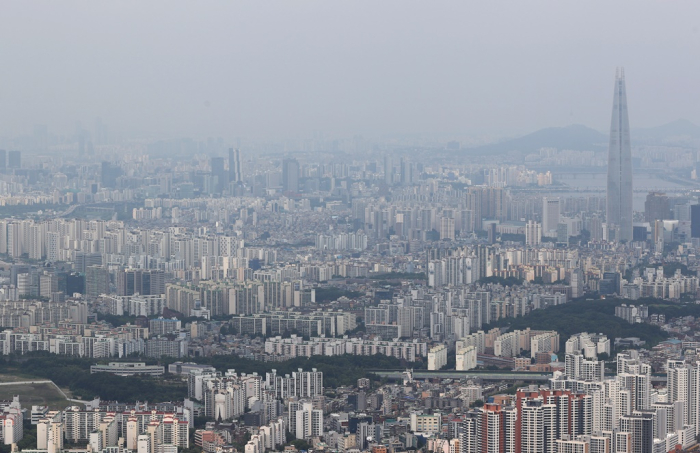South Korean house prices have risen more during the President Moon Jae-in administration than any other as the current government has focused more on reducing demand than increasing supply amid ample liquidity in a low interest rate environment.
The surge is a key factor driving
the Bank of Korea (BOK) to consider tightening monetary policy within the year even as record-breaking COVID-19 infections threaten growth in Asia’s fourth-largest economy, analysts said.
The combined value of dwellings reached a fresh high of 5,721.7 trillion won ($5 trillion) as of end-2020, up 13.1% from a year earlier, according to preliminary Korean National Balance Sheets released by the central bank on July 22.
The value has increased by 1,716.5 trillion won, or 42.9%, during the four years from 2017 when Moon took office, the largest growth among presidential administrations since 1995 when the statistics were first compiled. That compared with a 737 trillion won rise during the administration of former President Park Geun-hye, 748 trillion won growth during the government of former President Lee Myung-bak, and a 1,205.6 trillion won jump during the administration of the late former President Roh Moo-hyun.
The dwellings’ value is predicted to rise more than 50% during the current administration, given further growth in 2021.
Moon and Roh failed to stabilize property markets as they implemented a series of regulations including hefty taxes and lending restrictions, ignoring market principles based on supply and demand. The Moon administration has so far announced 25 measures to cool the market, but the property market has overheated anyway, led by apartments in the capital Seoul.
The average selling price of an apartment unit in Seoul was 1.1 billion won in June, 88.2% higher than 607 million won in May 2017 when Moon assumed office, according to Kookmin Bank. Prices of some apartments more than doubled during the period.
18 YEARS WITHOUT SPENDING TO BE ABLE TO BUY PROPERTY IN SEOULGrowth in property prices surpassed income growth. The housing price to income ratio (PIR) in Seoul was 17.8 times in the first quarter, the highest since 2004 when the data was first compiled, according to Kookmin Bank. That means one can buy property only if they save their income over 17.8 years without spending a penny.
That came as the Bank of Korea cut the benchmark interest rate to a record low of 0.50% in May of last year from 1.25% in May 2017 to cope with the economic impact of COVID-19.
As the cheap cash fueled speculation in property markets and pushed up housing prices, the government rushed to take countermeasures. But none of the steps succeeded in dampening the markets.
“As trust in government policies has disappeared, side effects such as property balloon effects in non-regulated areas in non-metropolitan regions have been growing since last year," said Real Estate 114 analyst Yoon Ji-hye.
House supply has been shrinking as the government put restrictions on building new houses, which some analysts say often pushed up overall property markets. Permits for future home construction in Seoul last year nearly halved to 58,181, the fewest in 11 years, from 113,131 in 2017. In addition, the government tightened rules on property transfer income taxes, reducing property transactions.
“Restrictions on reconstruction sharply reduced new housing, while excessive tax regulations blocked the supply of existing housing,” said Kwon Dae-jung, a professor of real estate studies at Myongji University.
Write to Ik-Hwan Kim and You-Jung Lee at
lovepen@hankyung.comJongwoo Cheon edited this article.






